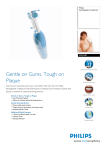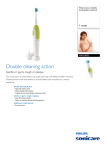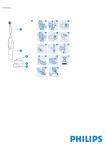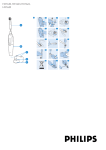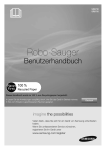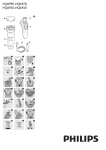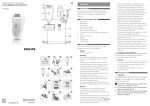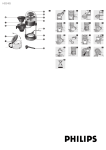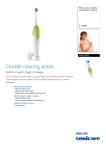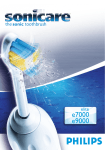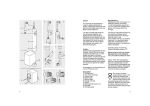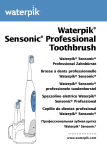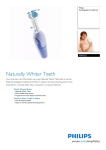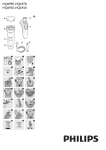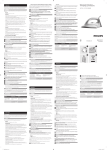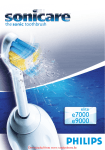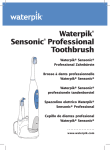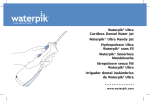Download HX1630, HX1624, HX1622, HX1620
Transcript
HX1630, HX1624, HX1622, HX1620 1 2 3 4 5 6 7 8 9 10 11 12 14 15 13 16 ENGLISH General description (Fig. 1) A Brush head B Handle C Brush head storage pins D Charger pin E Charger Important Read this user manual carefully before you use the appliance and save it for future reference. , Check if the voltage indicated on the bottom of the charger corresponds to the local mains voltage before you connect the appliance. , Keep the charger away from water. Do not place or store it over or near water contained in a bathtub, washbasin, sink etc. Do not immerse the charger in water or any other liquid. , Never use the charger if it is damaged or if the cord or plug is damaged. , The cord of the charger cannot be replaced. If the cord is damaged, the charger must be discarded. , Make sure the socket is live when you recharge the toothbrush. The electricity supply to sockets in mirror cabinets over washbasins or shaver sockets in bathrooms may be cut off when the light is turned off. , If you have had oral or gum surgery in the previous 2 months, consult your dentist before you use the toothbrush. , Do not use other brush heads than the ones recommended by the manufacturer. , Replace the brush head every 3 months or sooner if signs of wear appear, such as crushed or bent bristles. , This appliance is not intended for use by persons (including children) with reduced physical sensory or mental capabilities, or lack of experience and knowledge, unless they have been given supervision or instruction concerning use of the appliance by a person responsible for their safety. , Children should be supervised to ensure they do not play with the appliance. Electromagnetic fields (EMF) This Philips appliance complies with all standards regarding electromagnetic fields (EMF). If handled properly and according to the instructions in this user manual, the appliance is safe to use based on scientific evidence available today. Preparing for use Charging the appliance 1 Charge the appliance for at least 16 hours before you use it for the first time. , Make sure the appliance is switched off when you start to charge it (Fig. 2). , When the battery is being charged, the green indicator light is on (HX1630 only). , You can leave the toothbrush in the charger and let it charge continuously. Optimising the lifetime of the battery After you have charged the toothbrush for the first time, do not recharge it between brushings. Continue to use it until the battery is empty before you recharge it again. - Recharge the appliance when the motor almost stops running. - Repeat this procedure three times in a row. - To extend the lifetime of the battery, repeat this procedure every 6 months. Using the appliance 1 To mount the brush head on the toothbrush, insert it into the bayonet catch and turn it clockwise a quarter turn (Fig. 3). This prevents the brush head from becoming detached due to vibration. 2 Put toothpaste on the brush head. 3 Place the brush head in your mouth (Fig. 4). 4 Press the on/off button to switch on the toothbrush and start to brush your teeth (Fig. 5). , For the best brushing method and the minimum brushing time, see ‘Brushing tips’. 4203.000.5607.1 Brushing tips Brushing method 1 Place the brush head against the tooth in such a way that it covers the surface of the tooth as well as the gum line (Fig. 6). 2 Hold the brush head in this position for a few seconds and then move on to the next tooth (Fig. 7). The round brush head removes plaque from the teeth and beneath the gum line. The individually moving Active Tip cleans between the teeth. 3 Guide the brush head carefully along the teeth and molars (Fig. 8). Tip: Make sure you clean all surfaces of the teeth (inside, outside and chewing surface) as well as the gum line properly. A fixed brushing pattern prevents you from skipping certain areas. Tip: For optimal dental hygiene, use dental floss and toothpicks in addition to the electric toothbrush. Minimum brushing time A brushing time of 2 minutes is generally long enough to clean your teeth properly. If you want, you can brush longer than 2 minutes for an even more thorough clean. , A red indicator light will blink to indicate that 2 minutes have passed (HX1630 only). Note: If plaque is removed properly, the gums will have a pink colour and will firmly surround the teeth. Healthy gums do not bleed when you eat or brush your teeth. Note: If your gums bleed slightly the first few times you use this toothbrush, this bleeding will generally stop after a few days. If your gums continue to bleed, consult your dentist or dental hygienist. Gum protection 1 The Gum Protection system guarantees that you will not exert too much pressure on the teeth and gums. 2 If you exert too much pressure on the toothbrush, you will feel and hear a click when the brush head flexes backwards. As soon as you reduce the pressure, the brush head will return to its normal position. This will protect your gums (Fig. 9) Note:This will probably happen a few times when you first start using the brush. After some time you will have discovered the optimal brushing pressure and the brush head will flex backwards less often. Cleaning and storage 1 Switch on the toothbrush and rinse the brush head under a hot tap (max. 60 cC) (Fig. 10). 2 Switch off the toothbrush. Detach the brush head and rinse the inside of the brush head (Fig. 11). 3 Switch on the toothbrush and rinse the drive shaft under the tap to remove toothpaste residues (Fig. 12). 4 Store the brush head on the brush head storage pin on the charger. 5 Clean the charger with a moist cloth (Fig. 13). Unplug the charger before you start to clean it. Always remove the battery before you discard the appliance and hand it in at an official collection point. Dispose of the battery at an official collection point for batteries. If you have trouble removing the battery, you can also take the appliance to a Philips service centre. The staff of this centre will remove the battery for you and will dispose of it in an environmentally safe way. Disposal of the battery Make sure the battery is completely empty when you dispose of it. 1 Let the appliance run until it stops before you remove the battery. 2 Open the handle (Fig. 15) . 3 Use a screwdriver to pry the battery out of the battery holder (Fig. 16). The toothbrush is no longer watertight once the housing of the toothbrush has been open. When you open the housing, your guarantee becomes invalid. Guarantee & service If you need information or if you have a problem, please visit the Philips website at www.philips.com or contact the Philips Customer Care Centre in your country (you find its phone number in the worldwide guarantee leaflet). If there is no Customer Care Centre in your country, go to your local Philips dealer or contact the Service Department of Philips Domestic Appliances and Personal Care BV. Troubleshooting If you are unable to solve your problem with the information below, please contact the nearest Philips service centre or the Philips Customer Care Centre in your country. You can also contact us online at www. philips.com. Problem Solution The toothbrush does not work at all, although it has been in the charger overnight. Make sure that the plug of the charger is properly inserted into the wall socket. Make sure the socket is live (see chapter ‘Important’). Make sure the toothbrush is switched off and recharge it for at least 16 hours. The motor of the toothbrush works, but the brush head doesn’t. Check if the brush head has been properly attached to appliance (see also chapter ‘Using the appliance’). The brushing power of the toothbrush has greatly decreased. The toothbrush must be recharged. If you normally leave the toothbrush in the charger continuously, you may have to extend the lifetime of the battery as described in chapter ‘Preparing for use’. The toothbrush doesn’t clean my teeth as well as before. Replace the brush head. Replacement 1 Replace the brush head every 3 months for the best brushing results. , Also replace the brush head when the bristles start to bend outwards. You can obtain new brush heads from the shop where you purchased the toothbrush. All round Philips replacement brush heads can be used. Environment , Do not throw away the appliance with the normal household waste at the end of its life, but hand it in at an official collection point for recycling. By doing this, you help to preserve the environment (Fig. 14). , The built-in rechargeable battery contains substances that may pollute the environment. 2/13 DEUTSCH Allgemeine Beschreibung (Abb. 1) Bürstenkopf Handstück Bürstenkopf-Aufbewahrungsstifte Ladestift Ladegerät Wichtig Lesen Sie diese Bedienungsanleitung vor dem Gebrauch des Geräts aufmerksam durch und bewahren Sie sie für eine spätere Verwendung auf. , Prüfen Sie vor Inbetriebnahme, ob die Spannungsangabe auf der Unterseite des Ladegeräts mit der örtlichen Netzspannung übereinstimmt. , Halten Sie das Ladegerät von Wasser fern. Stellen Sie es nicht über oder direkt bei einer mit Wasser gefüllten Badewanne bzw. einem Waschbecken ab. Tauchen Sie das Ladegerät nicht in Wasser oder andere Flüssigkeiten. , Benutzen Sie das Ladegerät nicht, wenn es beschädigt ist oder wenn das Netzkabel oder der Netzstecker defekt ist. , Das Kabel des Ladegeräts kann nicht ausgetauscht werden. Ist das Kabel beschädigt, muss das Ladegerät entsorgt werden. , Prüfen Sie vor dem Aufladen der Zahnbürste, ob die Steckdose kontinuierlich Strom führt. Steckdosen in Badezimmerschränken über Waschbecken sowie Rasierer-Steckdosen werden häufig zusammen mit der Raumbeleuchtung ausgeschaltet. , Wenn in den vergangenen 2 Monaten ein chirurgischer Eingriff an Ihren Zähnen oder am Zahnfleisch vorgenommen wurde, sollten Sie vor Benutzung der Zahnbürste Ihren Zahnarzt konsultieren. , Benutzen Sie nur die vom Hersteller für diese Zahnbürste empfohlenen Bürstenköpfe. , Tauschen Sie den Bürstenkopf spätestens nach 3 Monaten aus oder sobald Abnutzungserscheinungen zu erkennen sind, wie z. B. abgeknickte oder zerdrückte Borsten. , Dieses Gerät ist für Benutzer (einschl. Kinder) mit eingeschränkten physischen, sensorischen oder psychischen Fähigkeiten bzw. ohne jegliche Erfahrung oder Vorwissen nur dann geeignet, wenn eine geeignete Aufsicht oder ausführliche Anweisungen zur Benutzung des Geräts sichergestellt sind. , Achten Sie darauf, dass Kinder nicht mit dem Gerät spielen. A B C D E Elektromagnetische Felder (EMF; Electro Magnetic Fields) Dieses Philips Gerät erfüllt sämtliche Normen bezüglich elektromagnetischer Felder (EMF). Nach aktuellen wissenschaftlichen Erkenntnissen ist das Gerät sicher im Gebrauch, sofern es ordnungsgemäß und entsprechend den Anweisungen in dieser Bedienungsanleitung gehandhabt wird. Für den Gebrauch vorbereiten Das Gerät laden 1 Laden Sie das Gerät vor dem ersten Gebrauch mindestens 16 Stunden lang auf. , Achten Sie darauf, dass das Gerät ausgeschaltet ist, wenn Sie mit dem Laden beginnen (Abb. 2). , Beim Laden des Akkus leuchtet die grüne Kontrollanzeige auf (nur HX1630). , Sie können die Zahnbürste zum kontinuierlichen Nachladen im Ladegerät belassen. Die Lebensdauer des Akkus optimieren Laden Sie die Zahnbürste vor der ersten Benutzung vollständig auf. Laden Sie sie aber nicht nach jeder Anwendung neu auf. Benutzen Sie die Zahnbürste solange ohne Nachladen, bis der Akku leer ist. - Laden Sie den Akku erst wieder auf, wenn der Motor beinahe zum Stillstand kommt. - Wiederholen Sie diesen Vorgang dreimal nacheinander. - Sie können die Lebensdauer des Akkus verlängern, wenn Sie diesen Vorgang alle 6 Monate wiederholen. Das Gerät benutzen 1 Um den Bürstenkopf aufzusetzen, setzen Sie ihn in den Bajonettverschluss und sichern Sie ihn mit einer Vierteldrehung im Uhrzeigersinn (Abb. 3). Danach kann der Bürstenkopf nicht mehr durch die Vibrationen gelockert werden. 2 Tragen Sie etwas Zahnpasta auf den Bürstenkopf auf. 3 Halten Sie die Bürste an die Zähne (Abb. 4). 4 Betätigen Sie den Ein-/Ausschalter, um die Zahnbürste einzuschalten und mit dem Putzen zu beginnen (Abb. 5). , Unter “Hinweise zur Zahnpflege” erhalten Sie Informationen zur richtigen Technik sowie zur Mindest-Putzzeit. Hinweise zur Zahnpflege Putztechnik 1 Setzen Sie den Bürstenkopf so an die Zähne, dass er die Zahnoberfläche und den Zahnfleischrand bedeckt (Abb. 6). 2 Halten Sie den Bürstenkopf einige Sekunden in dieser Position, und führen Sie ihn dann zum nächsten Zahn (Abb. 7). Der runde Bürstenkopf entfernt die Plaque vom Zahn und unterhalb des Zahnfleischrandes. Die Interdentalbürste, die sich unabhängig von der runden Bürste bewegt, reinigt die Zahnzwischenräume. 3 Führen Sie die Bürste sorgfältig an allen Zähnen entlang (Abb. 8). Tipp: Achten Sie darauf, dass alle Zahnflächen – d. h. Innenund Außenflächen sowie Kauflächen und Zahnfleischrand gründlich gereinigt werden. Eine feste Putzroutine verhindert, dass Sie gewisse Bereiche vernachlässigen. Tipp: Zur optimalen Zahnpflege wird ergänzend zur elektrischen Zahnbürste die Verwendung von Zahnseide und Zahnstochern empfohlen. Mindest-Putzzeit Normalerweise sind 2 Minuten ausreichend, um die Zähne gründlich zu putzen. Für eine besonders gründliche Reinigung können Sie die Zähne selbstverständlich auch länger als 2 Minuten putzen. , Nach Ablauf von 2 Minuten blinkt eine rote Kontrollanzeige (nur HX1630). Hinweis:Wenn Sie die Plaque gründlich entfernt haben, hat das umgebende Zahnfleisch eine hellrote Färbung und liegt fest am Zahn an. Gesundes Zahnfleisch blutet nicht beim Essen oder beim Zähneputzen. 4 Stecken Sie den Bürstenkopf zur Aufbewahrung auf den Stift am Ladegerät. 5 Reinigen Sie das Ladegerät mit einem feuchten Tuch (Abb. 13). Ziehen Sie vor dem Reinigen des Ladegeräts den Netzstecker aus der Steckdose. Ersatz 1 Das beste Ergebnis erhalten Sie, wenn Sie den Bürstenkopf alle 3 Monate ersetzen. , Ersetzen Sie den Bürstenkopf auch, sobald sich die Borsten nach außen verbiegen. Neue Bürstenköpfe erhalten Sie dort, wo das Gerät gekauft wurde. Sie können universale PHILIPS Ersatz-Bürstenköpfe verwenden. Umweltschutz , Werfen Sie das Gerät am Ende der Lebensdauer nicht in den normalen Hausmüll. Bringen Sie es zum Recycling zu einer offiziellen Sammelstelle. Auf diese Weise helfen Sie, die Umwelt zu schonen (Abb. 14). , Der integrierte Akku enthält Substanzen, die die Umwelt gefährden können. Entfernen Sie den Akku, bevor Sie das Gerät an einer offiziellen Recyclingstelle abgeben. Geben Sie den gebrauchten Akku bei einer Batteriesammelstelle ab. Falls Sie beim Entfernen des Akkus Probleme haben, können Sie das Gerät auch an ein Philips Service-Center geben. Dort wird der Akku umweltgerecht entsorgt. Den Akku entsorgen Vergewissern Sie sich, dass der Akku ganz leer ist, bevor Sie ihn entsorgen. 1 Lassen Sie vorher den Motor laufen, bis er stillsteht. 2 Öffnen Sie das Handstück (Abb. 15). 3 Nehmen Sie den Akku mithilfe eines Schraubendrehers aus dem Akkuhalter (Abb. 16). Nach dem Öffnen des Gehäuses ist die Zahnbürste nicht mehr wasserdicht. Wenn Sie das Gehäuse öffnen, erlischt Ihre Garantie. Garantie und Kundendienst Benötigen Sie weitere Informationen oder treten Probleme auf, wenden Sie sich bitte an Ihren PhilipsHändler oder setzen Sie sich mit einem Philips ServiceCenter in Ihrem Land in Verbindung (Telefonnummer siehe Garantieschrift). Besuchen Sie auch die Philips Website (www.philips.com). Sie können auch direkt die Service-Abteilung von Philips Domestic Appliances and Personal Care BV kontaktieren. Hinweis: Sollte es anfangs doch zu leichten Zahnfleischblutungen kommen, so klingen sie in der Regel nach einigen Tagen ab. Sollten die Beschwerden andauern, konsultieren Sie bitte Ihren Zahnarzt. Zahnfleischschutz 1 Die Druckkontrolle (das sog. Gum Protection System) verhindert, dass Sie bei der Zahnpflege mit der Bürste zu stark auf Zähne und Zahnfleisch drücken. 2 Drücken Sie den Bürstenkopf zu stark an, schnellt der Bürstenaufsatz hörbar (“Klick”) und spürbar zurück. So wird Ihr Zahnfleisch vor Beschädigungen geschützt (Abb. 9). Hinweis:Während der Eingewöhnungsphase wird Ihnen das häufiger passieren. Bald aber finden Sie automatisch den richtigen Andruck, und der Bürstenaufsatz wird nur noch selten zurückschnellen. Reinigung und Aufbewahrung 1 Schalten Sie die Zahnbürste ein und spülen Sie den Bürstenkopf unter fließendem warmen Wasser von max. 60c°C ab (Abb. 10). 2 Schalten Sie die Zahnbürste aus. Nehmen Sie den Bürstenkopf ab und spülen Sie ihn von innen aus (Abb. 11). 3 Schalten Sie die Zahnbürste wieder ein und spülen Sie den Schaft ab, um restliche Zahnpasta zu entfernen (Abb. 12). 4203.000.5607.1 3/13 Fehlerbehebung Sollten Sie eventuell auftretende Probleme anhand der folgenden Informationen nicht lösen können, so wenden Sie sich bitte an das Philips Service Center in Ihrem Land oder nehmen Sie online über www.philips.com mit uns Kontakt auf. Problem Lösung Die Zahnbürste funktioniert nicht, obwohl sie über Nacht aufgeladen wurde. Prüfen Sie, ob der Netzstecker des Ladegeräts fest in der Steckdose steckt. Prüfen Sie, ob die Steckdose kontinuierlich Strom führt (siehe Kapitel “Wichtig”). Schalten Sie das Gerät aus, und laden Sie den Akku mindestens 16 Stunden lang auf. Der Motor läuft, aber der Bürstenkopf funktioniert nicht. Prüfen Sie, ob der Bürstenkopf korrekt auf dem Handstück angebracht ist (siehe auch Kapitel “Das Gerät benutzen”). Die Putzleistung ist spürbar schwächer geworden. Die Zahnbürste muss aufgeladen werden. Wenn Sie die Zahnbürste normalerweise im Ladegerät aufbewahren, müssen Sie die Lebensdauer des Akkus möglicherweise optimieren. Befolgen Sie dazu die Anweisungen im Kapitel “Für den Gebrauch vorbereiten”. Die Zahnbürste reinigt nicht mehr so gründlich wie vorher. Ersetzen Sie den Bürstenkopf. 4203.000.5607.1 4/13 Español Descripción general (fig. 1) Cabezal del cepillo Mango Soportes para cabezales Pivote de carga Cargador Importante Antes de usar el aparato, lea atentamente este manual del usuario y consérvelo por si necesitara consultarlo en el futuro. , Antes de enchufar el aparato, compruebe si el voltaje indicado en la parte inferior del cargador se corresponde con el voltaje de red local. , Mantenga el cargador alejado del agua. No coloque ni guarde el cargador por encima o cerca de agua contenida en bañeras, lavabos, fregaderos, etc. No sumerja el cargador en agua ni en otros líquidos. , No utilice nunca el cargador si está dañado o si el cable o la clavija están dañados. , El cable del cargador no se puede sustituir. Si el cable está dañado, deberá desechar el cargador. , Asegúrese de que el enchufe tenga corriente cuando recargue el cepillo dental. El suministro eléctrico a los enchufes de los armarios o espejos de los cuartos de baño, o a los enchufes para afeitadoras de los cuartos de baño, puede quedar interrumpido al apagar la luz. , Consulte a su dentista antes de utilizar este cepillo dental si ha sufrido cirugía oral o de las encías en los 2 últimos meses. , No utilice otros cabezales que no sean los recomendados por el fabricante. , Sustituya el cabezal del cepillo cada 3 meses o antes si aparecen signos de desgaste, como cerdas aplastadas o curvadas. , Este aparato no debe ser usado por personas (incluidos los niños) con su capacidad físicosensorial o psíquica reducida, ni por quienes no tengan los conocimientos y la experiencia necesarios, a menos que sean supervisados o instruidos acerca del uso del aparato por una persona responsable de su seguridad. , Asegúrese de que los niños no jueguen con este aparato. A B C D E Campos electromagnéticos (CEM) Este aparato Philips cumple todos los estándares sobre campos electromagnéticos (CEM). Si se utiliza correctamente y de acuerdo con las instrucciones de este manual, el aparato se puede usar de forma segura según los conocimientos científicos disponibles hoy en día. Preparación para su uso Carga del aparato 1 Antes de usar el aparato por vez primera, cárguelo durante al menos 16 horas. , Asegúrese de que el aparato esté apagado cuando comience a cargarlo (fig. 2). , Cuando la batería se está cargando, el piloto indicador verde se ilumina (sólo modelo HX1630). , Puede dejar el cepillo dental en el cargador y dejarlo cargando de manera continua. Cómo optimizar la vida útil de la batería Después de haber cargado el cepillo dental por primera vez, no vuelva a recargarlo entre cepillados. Continúe utilizándolo y vuelva a cargarlo sólo cuando la batería esté descargada. - Recargue el aparato cuando el motor casi deje de funcionar. - Repita este procedimiento tres veces seguidas. - Para prolongar la vida de la batería, repita este procedimiento cada 6 meses. Uso del aparato 1 Para montar el cabezal en el mango del cepillo dental, insértelo en el eje con enganche de bayoneta y gírelo en el sentido de las agujas del reloj un cuarto de vuelta (fig. 3). Esto evita que el cabezal del cepillo se suelte por las vibraciones. 2 Ponga pasta de dientes en el cabezal del cepillo. 3 Introduzca el cabezal del cepillo en la boca (fig. 4). 4203.000.5607.1 4 Pulse el botón de encendido/apagado para encender el cepillo dental y comience a cepillarse los dientes (fig. 5). , Para conocer el mejor método de cepillado y el tiempo mínimo recomendado, consulte “Consejos de cepillado”. Consejos de cepillado Método de cepillado 1 Coloque el cabezal del cepillo sobre el diente de modo que cubra la superficie del mismo y la línea de la encía (fig. 6). 2 Mantenga el cabezal del cepillo en esa posición durante unos segundos y luego pase al diente siguiente (fig. 7). El cabezal redondo del cepillo elimina la placa de los dientes y debajo de la línea de las encías. La Punta Interdental limpia entre los dientes moviéndose por separado. 3 Guíe el cabezal del cepillo con cuidado a lo largo de los dientes y las muelas (fig. 8). Consejo: Asegúrese de limpiar bien toda las superficies de los dientes (interior, exterior y de masticación), así como la línea de las encías. Una rutina fija de cepillado evitará que olvide cepillar ciertas zonas. Consejo: Para una higiene dental óptima, utilice hilo dental y palillos de dientes además del cepillo dental eléctrico. Tiempo mínimo de cepillado Un tiempo de cepillado de 2 minutos normalmente es suficiente para limpiarse los dientes correctamente. Si lo desea, puede cepillarse los dientes durante más de 2 minutos para una limpieza más a fondo. , Un piloto indicador rojo parpadeará para indicar que han transcurrido 2 minutos (sólo modelo HX1630). Nota: Si se elimina la placa correctamente, las encías tendrán un color rosa y rodearán los dientes con firmeza. Las encías sanas no sangran cuando come o cuando se cepilla los dientes. Nota: Si sus encías sangran ligeramente las primeras veces que utilice el cepillo dental, normalmente dejarán de hacerlo a los pocos días. Si después de unos días sus encías continúan sangrando al cepillarse los dientes, consulte a su dentista o higienista dental. Sustituya también el cabezal del cepillo cuando las cerdas empiecen a doblarse hacia fuera. Puede adquirir cabezales nuevos en el distribuidor donde haya comprado su cepillo dental. Puede usar cualquier cabezal de cepillo redondo de Philips. Medio ambiente , Al final de su vida útil, no tire el aparato junto con la basura normal del hogar. Llévelo a un punto de recogida oficial para su reciclado. De esta manera ayudará a conservar el medio ambiente (fig. 14). , La batería recargable incorporada contiene sustancias que pueden contaminar el medio ambiente. Quite siempre la batería antes de deshacerse del aparato y de llevarlo a un punto de recogida oficial. Deposite la batería en un lugar de recogida oficial. Si no puede sacar la batería, puede llevar el aparato a un servicio de asistencia técnica de Philips. El personal del servicio de asistencia extraerá la batería y se deshará de ella de forma no perjudicial para el medio ambiente. , Cómo extraer la batería Asegúrese de que la batería está completamente descargada cuando se deshaga de ella. 1 Deje que el aparato funcione hasta que se pare antes de extraer la batería. 2 Abra el mango (fig. 15). 3 Utilice un destornillador para separar la batería del soporte (fig. 16). El cepillo dental deja de ser hermético una vez que se ha abierto la carcasa del mismo. Si la abre, la garantía queda anulada. Garantía y servicio Si necesita información o tiene algún problema, visite la página Web de Philips en www.philips.com, o póngase en contacto con el Servicio de Atención al Cliente de Philips en su país (hallará el número de teléfono en el folleto de la garantía mundial). Si no hay Servicio de Atención al Cliente de Philips en su país, diríjase a su distribuidor local Philips o póngase en contacto con el Service Department de Philips Domestic Appliances and Personal Care BV. Protección de las Encías 1 El sistema de Protección de las Encías evita que se ejerza demasiada presión sobre los dientes y las encías. 2 Si ejerce demasiada presión sobre el cepillo dental, notará y oirá un “clic” cuando el cabezal del cepillo se flexiona hacia atrás. En cuanto reduzca la presión, el cabezal del cepillo volverá a su posición normal. Esto protegerá sus encías (fig. 9). Nota:Probablemente esto sucederá varias veces cuando empiece a utilizar el aparato. Después de algún tiempo habrá descubierto la presión de cepillado óptima y el cabezal del cepillo se flexionará hacia atrás con menos frecuencia. Limpieza y almacenamiento 1 Encienda el cepillo dental y enjuague el cabezal del cepillo bajo el grifo con agua caliente (temperatura máxima de 60 cC). (fig. 10) 2 Apague el cepillo dental. Quite el cabezal del cepillo y enjuáguelo bien por dentro (fig. 11). 3 Encienda el cepillo dental y enjuague el eje motor bajo el grifo para eliminar los restos de pasta dental (fig. 12). 4 Coloque el cabezal del cepillo en su soporte en el cargador. 5 Limpie el cargador con un paño húmedo (fig. 13). Desenchufe el cargador antes de limpiarlo. Sustitución 1 Sustituya el cabezal del cepillo cada 3 meses para obtener los mejores resultados de cepillado. 5/13





